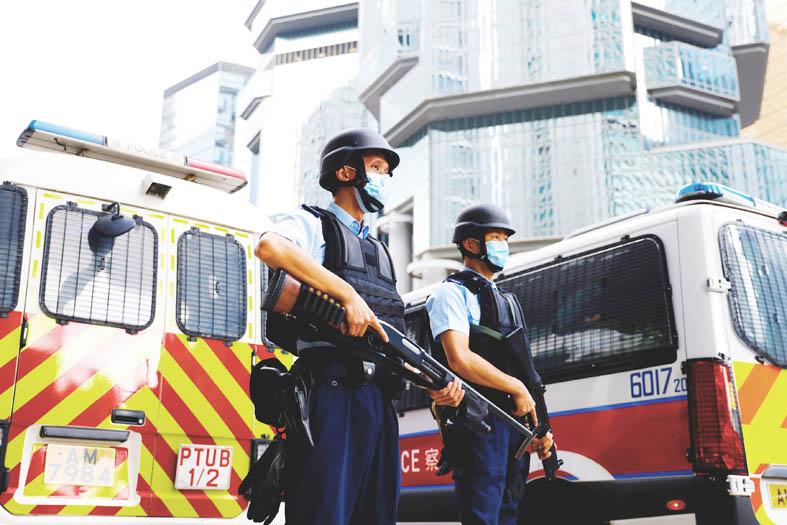Two Hong Kongers accused of being part of a group that campaigned for international sanctions against China yesterday pleaded guilty under the territory’s National Security Law in a case that is linked to jailed pro-democracy tycoon Jimmy Lai (黎智英).
China imposed the sweeping security legislation last year to wipe out dissent after Hong Kong was rocked by huge and often violent democracy protests.
More than 130 people, including many of Hong Kong’s best-known democracy advocates, have since been arrested under the law.

Photo: Reuters
Democracy activist Andy Li (李宇軒), 31, and paralegal Chan Tsz-wah (陳梓華), 30, admitted to a charge of “colluding with foreign forces to endanger China’s national security.”
Prosecutors said they were part of a group that organized the publishing of adverts and articles in overseas newspapers calling for sanctions against China.
They were in custody ahead of their plea.
Little has been heard in open court about the case against the duo, but they are part of a group of people linked to Lai, who is facing the same national security charge.
Authorities have accused Lai, 73, of running a “criminal syndicate” that lobbied for international sanctions against China over its crackdown in Hong Kong.
At yesterday’s hearing, prosecutors read out a summary of the allegations against the two defendants. In it, they accused Lai and his American aide, Mark Simon, of being “masterminds and financial support behind the scene and at the highest level of the syndicate.”
Chan allegedly delivered Lai and Simon’s instructions to Li.
Simon left Hong Kong last year and has previously described the prosecution against Lai and others as a political witch hunt against Beijing’s critics.
In an e-mail, he said he believed that Li and Chan “are making statements under great duress, with questionable legal representation, and with Andy still having charges in China over his head.”
Lai’s newspaper Apple Daily closed in June after authorities used the security law to freeze its assets over the content of the tabloid’s reporting.
Li was one of 12 Hong Kongers who last year made a failed attempt to flee Hong Kong by speedboat for Taiwan.
They were intercepted by the Chinese coast guard and held in detention until their conviction at a closed hearing for illegal border crossing.
The group were eventually returned to Hong Kong custody.
Charges of Li and Chan assisting offenders over the fugitives case have been shelved by the prosecution as the pair pleaded guilty to the collusion offenses.
They were remanded back into custody following their plea with the next hearing scheduled for January.

MAKING WAVES: China’s maritime militia could become a nontraditional threat in war, clogging up shipping lanes to prevent US or Japanese intervention, a report said About 1,900 Chinese ships flying flags of convenience and fishing vessels that participated in China’s military exercises around Taiwan last month and in January last year have been listed for monitoring, Coast Guard Administration (CGA) Deputy Director-General Hsieh Ching-chin (謝慶欽) said yesterday. Following amendments to the Commercial Port Act (商港法) and the Law of Ships (船舶法) last month, the CGA can designate possible berthing areas or deny ports of call for vessels suspected of loitering around areas where undersea cables can be accessed, Oceans Affairs Council Minister Kuan Bi-ling (管碧玲) said. The list of suspected ships, originally 300, had risen to about

DAREDEVIL: Honnold said it had always been a dream of his to climb Taipei 101, while a Netflix producer said the skyscraper was ‘a real icon of this country’ US climber Alex Honnold yesterday took on Taiwan’s tallest building, becoming the first person to scale Taipei 101 without a rope, harness or safety net. Hundreds of spectators gathered at the base of the 101-story skyscraper to watch Honnold, 40, embark on his daredevil feat, which was also broadcast live on Netflix. Dressed in a red T-shirt and yellow custom-made climbing shoes, Honnold swiftly moved up the southeast face of the glass and steel building. At one point, he stepped onto a platform midway up to wave down at fans and onlookers who were taking photos. People watching from inside

Japan’s strategic alliance with the US would collapse if Tokyo were to turn away from a conflict in Taiwan, Japanese Prime Minister Sanae Takaichi said yesterday, but distanced herself from previous comments that suggested a possible military response in such an event. Takaichi expressed her latest views on a nationally broadcast TV program late on Monday, where an opposition party leader criticized her for igniting tensions with China with the earlier remarks. Ties between Japan and China have sunk to the worst level in years after Takaichi said in November that a hypothetical Chinese attack on Taiwan could bring about a Japanese

The WHO ignored early COVID-19 warnings from Taiwan, US Deputy Secretary of Health and Human Services Jim O’Neill said on Friday, as part of justification for Washington withdrawing from the global health body. US Secretary of State Marco Rubio on Thursday said that the US was pulling out of the UN agency, as it failed to fulfill its responsibilities during the COVID-19 pandemic. The WHO “ignored early COVID warnings from Taiwan in 2019 by pretending Taiwan did not exist, O’Neill wrote on X on Friday, Taiwan time. “It ignored rigorous science and promoted lockdowns.” The US will “continue international coordination on infectious